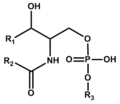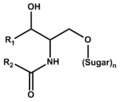Category:LBS: Difference between revisions
| Line 38: | Line 38: | ||
<references/> | <references/> | ||
==Biosynthesis== | =={{Bilingual|生合成|Biosynthesis}}== | ||
{{Twocolumn| | {{Twocolumn| | ||
Sphingosine is synthesized from decarboxylating condensation of palmitoyl CoA with serine on the ER membrane. It is a 18-carbon amino alcohol (16 carbons from palmitic acid and 2 from serine) with one unsaturated bond (trans-form) at the C-4 position (2-amino-4-octadecene-1,3-diol). ([[:Category:LBS/Biosynthesis|more details]]) | Sphingosine is synthesized from decarboxylating condensation of palmitoyl CoA with serine on the ER membrane. It is a 18-carbon amino alcohol (16 carbons from palmitic acid and 2 from serine) with one unsaturated bond (trans-form) at the C-4 position (2-amino-4-octadecene-1,3-diol). ([[:Category:LBS/Biosynthesis|more details]]) | ||
Revision as of 20:16, 15 March 2016
Sphingolipid
Upper classes: LB
Class Overview
The Sphingolipid category (LBS) in this database includes phosphosphingolipid and glycosphingolipid. |
このデータベースではスフィンゴ脂質をスフィンゴリン脂質とスフィンゴ糖脂質に分けています。 |
| Sphingolipid Overview | ||
|---|---|---|
|
Phosphosphingolipid |
Glycosphingolipid
| |
Sphingosine & Ceramide
Sphingolipids were first isolated from brain by J.L.W. Thudichum (1829-1901) as lipids of unknown function and structure.[1] The basic structure is a long-chain base (long-chain amino-alcohol) whose amino-group is acylated with a long-chain fatty acid. This hydrophobic structure is called ceramides. Sphingolipid consists of phospho-sphingolipid and glyco-sphingolipid, whose ceramide structure is bonded with phosphate and (poly)saccharides, respectively. Phosphosphingolipid includes sphingomyelin, and glycosphingolipid, cerebrosides and gangliosides. Both are abundant in neural tissues.[2] |
スフィンゴ脂質は J.L.W. Thudichum (1829-1901) により機能や構造未知の脂質として脳から見いだされました。基本骨格は長鎖塩基 (長鎖アミノアルコール) のアミノ基が長鎖脂肪酸とアミド結合したもので、セラミドと呼ばれます。 スフィンゴ脂質はセラミドにリン酸が結合したスフィンゴリン脂質と糖が結合したスフィンゴ糖脂質に分けられます。スフィンゴリン脂質にはスフィンゴミエリンが、スフィンゴ糖脂質にはセレブロシドやガングリオシドなどが含まれ、いずれも神経系に多く存在します。 |
Biosynthesis
Sphingosine is synthesized from decarboxylating condensation of palmitoyl CoA with serine on the ER membrane. It is a 18-carbon amino alcohol (16 carbons from palmitic acid and 2 from serine) with one unsaturated bond (trans-form) at the C-4 position (2-amino-4-octadecene-1,3-diol). (more details) |
スフィンゴシンはパルミトイルCoAがアミノ酸セリンと脱炭酸縮合して生成します。炭素を18個含むアミノアルコール(16個がパルミチン酸、2個がセリン由来)でトランス型の不飽和結合をC-4に1つ含みます。(詳細はこちら) |
Sphingolipid スフィンゴ脂質
Notation
Page/ID-Code Design
Major series in this database are determined by phosphate-bound molecules or sugars for phosphosphingolipids, and by polysaccharide chains bound to ceramides for glycosphingolipids. The IUPAC series for glycosphingolipids (1977) are based on the order and bonding patterns of four sugars, but our series are based on three sugars for a wider coverage. Two original series, Echino and Plathy, are also included. |
スフィンゴリン脂質はリン酸に結合する分子や糖の種類、スフィンゴ糖脂質はセラミドに結合する糖鎖により系列を作成しています。1977年にIUPACにより提唱されたスフィンゴ糖脂質の系列は長鎖塩基に結合する四糖の並びと結合を基準にしていますが、ここではより広い糖鎖の系列を検索できるよう、三糖を基準に分類しています。またIUPACには無いEchinoとPlathyの系列を加えています。 |
|
| ||||||||||||||||||||||||||||
First (s1) Code for Glycosphingolipid
Second (s2) Code for subsequent sugars
For abbreviations, see #Notation.
|
|
|

